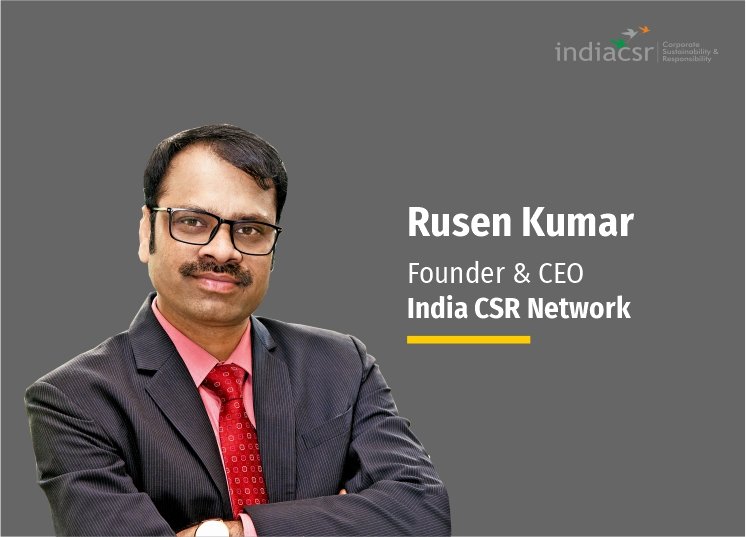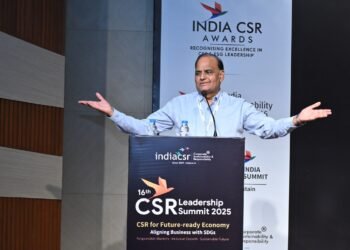S. D Shibulal, co-founder Infosys India and Permanent Trustee, The Shibulal Family Philanthropic Initiatives, talked to Rusen Kumar, Editor, India CSR on the importance of education for the underserved communities and intervention of technology in education. He said, “Integrating technology into existing curricula, as opposed to using it solely as a crisis-management tool, not only enables teachers to harness online learning as a powerful educational tool but also can provide a collaborative common platform for various actors in the educational ecosystem to come together, co-create and find solutions for transforming India’s K-12 education through systemic change.”
He also spoke about the various aspects of the New Education Policy 2020 and his initiative ShikshaLokam continues to bridge the gaps in capacity building and leadership development in the education sector.
Brief me about the Shibulal Family Philanthropic Initiatives (SFPI) and its various educational initiatives.
Both Kumari and I owe much of our achievements to the education we received. Education has the power to transform the overall health of underserved communities and has always been a priority for SFPI. All our initiatives (Shikshalokam, Vidyadhan, Ankur, The Samhita Academy and Vidyarakshak) are based on the premise of providing quality education opportunities to underserved youth so that they can build better futures for themselves and their families. Though each initiative uses different models, the success of all of them is dependent on the partnerships we make with critical stakeholders.
‘ShikshaLokam’ looks to enable change in the education sector by empowering education leaders. We partner with NGOs and CSOs to unbundle and customise solutions that we distribute to education leaders through our platform. Shikshalokam helps plug some of the gaps that exist in education-leadership capacity building and provides a vibrant platform for education leaders to collaborate and innovate.
‘Vidyadhan’ provides need-based scholarships to meritorious students to pursue higher education. We use a sponsorship model of ‘Each One, Teach One’ where sponsors offer financial support as well as career guidance to students. Our students commit to sponsoring another student once they become financially sustainable themselves, making it a pay-it-forward system. Our vision is to increase Vidyadhan’s impact from over 20,000 scholarships in 10 States to 100,000 scholarships in all States in the next 5-7 years.
Vidyarakshak is another scholarship programme that is dedicated towards children of martyrs from the Central Armed Police Forces vide BSF, CRPF, CISF, ITBP, SSB & Assam Rifles from across India. We liaison with the Ministry of Home Affairs for administrative guidance in the execution of the programme.
Ankur is a comprehensive residential scholarship programme that aims to secure equal opportunities for children from underprivileged sections of society by placing them in a caring and supportive environment. Ankur assumes complete responsibility for children at a young age, taking care of their physical and emotional wellbeing as well as their education. The parent-child bond is nurtured through regular visits, but Ankur plays a principal role in securing the future of the child.
The Samhita Academy is the school that Ankur students attend and is set up by the Advaith Foundation on the same campus. It is a quality English medium school that is also attended by students from upper-middle-class families. Ankur students are provided with the same opportunities and extra-curricular activities that are available to fee-paying students and are also given career guidance appropriate to their talents and aspirations.
We have partnered with Mantra4Change to work on EduMentum, a three-year incubation programme that enables early-stage non-profit organisations to build robust contextual solutions to achieve systemic education transformation across India.
We support the higher education of sportspersons from Karnataka with our ‘Vidya Kreeda’ initiative.
Apart from the education sector, our Akshaya Shree Award empowers rural communities by promoting organic farming while Ayur Raksha provides medical care to pediatric patients with life-threatening conditions. We have managed to support over 3,282 pediatric surgeries till now.
Since its inception, how has ShikshaLokam and SFPI’s journey been so far?
The Indian education sector is an extremely large complex system. Anyone attempting to make an impact must factor in this and take a systems design approach. We realised that to transform education, it is important to create an ecosystem and network of actors that are focused on improving the system. We founded ShikshaLokam in 2017 to focus on building the capacities of a critical group of stakeholders – education leaders. ShikshaLokam is a digital platform that enables education leadership development and collaboration opportunities with speed, scale and sustainability. We provide education leaders with the tools to observe, assess, and prioritise the needs of their system while continuously learning and analysing insights to make decisions. Co-creation and collaboration through professional learning communities are at the core of ShikshaLokam’s work.
ShikshaLokam offers open-source technology capabilities and resources to a variety of ecosystem players, including Individuals, NGOs, and governments. The ecosystem is brimming with innovative solutions for education leadership and there are several interventions run by various context-intensive changemakers. ShikshaLokam works with over 50 NGOs and other partners across states to customise interventions to specific geographies and transmits them through the platform to first mile users – education leaders. These include Unnati (micro-Improvements), Samiksha (In-context observations), Bodh (in-context-learning) and Dhiti (on-demand dashboards).
Overall, the journey has been a positive one. COVID-19 has, of course, throwing a wrench in our plans like it has for everyone else. This is not necessarily a bad thing as many of our initiatives were able to leverage technology to not just continuously grow, but also accelerate as well. We have ambitious goals of continuing this trajectory and expanding the reach of ShikshaLokam to all states in the country within a decade.
What is the kind of challenges you faced especially during the pandemic and how did you leverage your platform to overcome those challenges?
COVID-19 threw up unprecedented challenges for us as it did for everyone else. The primary challenge was, of course, shifting processes online. From a broader perspective that meant helping students and teachers manage the transition to online classes and cope with the pandemic – one area that we focused on was the building of life skills. We stayed continuously engaged with all our students and ensured that they attended classes regularly. This yielded a positive result as our feedback scores were better than the previous year. From a narrower perspective, it meant that we had to digitise our internal processes which we managed to do relatively quickly. Some initiatives like Vidyadhan had the additional complication of having a residential training programme for all new entrees. However, we were able to leverage technology and conduct all our programmes online.
Many of our initiatives like ShikshaLokam already had a headstart as technology platforms are a core part of their functioning. For them, COVID-19 also presented a unique opportunity – sheer necessity has removed most of the fear and misgivings parents and teachers had in leveraging technology for education. This is a significant reason why there has been an explosion of exponential growth in many of our initiatives.
ShikshaLokam was always intended to be a powerful platform that provides education leaders with the tools to adapt to difficult circumstances. We knew that COVID-19 and its after-effects would present one of the biggest challenges ever faced by education leaders and were committed to helping them through these times. We have been collaborating with various state governments to co-design COVID responses for public schools to ensure continuity of learning. Through our education leadership platform, we have supported and co-designed multiple digital process orchestration and capacity-building programmes across states.
Digital Process Orchestration
ShikshaLokam has been working with the Department of School Education in Punjab to drive systemic reforms. Parents were engaged in regular Virtual Parent Teachers Meetings to support learning at home. This September, more than 25 lakh parents were reached using phone or video calls. Teachers made an effort to understand their challenges and shared productive learning practices at home. Using ShikshaLokam’s application (Darpan), the department could get real-time visibility into the challenges faced by parents and could offer systemic responses disseminated through multiple media like TV, radio and learning apps.
Capacity Building
A self-learning programme that leveraged the ShikshaLokam platform to reach over 180,000 teachers in Andhra Pradesh was launched called the Comprehensive Learning Enhancement Programme (CLEP). We also implemented online capacity-building programmes for education leaders (CRPs, HMs) in Karnataka and Andhra Pradesh.
How, you think, the government could help in promoting quality education among deprived and discriminated sections of the population?
I feel the government has made commendable efforts in promoting quality education for all. For example, to focus on quality education, the 2010 rules for the Right of Children to Free and Compulsory Education (RTE) Act, 2009 were amended in 2017 to mention class-wise, subject-wise learning outcomes. These Central Rules serve as a guideline and template for states and Union Territories to pass their own rules to implement the RTE Act. The Right of Children to Free and Compulsory Education (Amendment) Act was also passed in January 2019. The Amendment empowers appropriate governments to make decisions on whether to hold back children in Class 5 and Class 8. The Central Government has launched an integrated scheme for school education called Samagra Shiksha, w.e.f. 2018-19 which consolidated three previous Centrally Sponsored schemes for school education.
A special mention must go to the National Education Policy (NEP 2020. It contains a host of measures that many have long called for and represents a paradigm shift in the sector. I am looking forward to seeing the benefits that will result from its implementation.
How is ShikshaLokam leveraging its platform to demystify the NEP 2020 and the opportunities that come with it?
The NEP 2020 is a key directional document. It is focused on a variety of factors and makes many bold and progressive recommendations. These include incorporating Early Childhood Care and Education (ECCE) into the structure of school education, providing flexibility with choosing subjects, etc. Many of these recommendations will necessarily require wholesale changes and redesigns of core structures and processes. Successful implementation will require strong leaders with the capacity and clarity of purpose necessary to achieve objectives on the ground. Meeting the compliance requirements will be no easy task, especially in the wake of COVID, and education leaders will need all the assistance they can get.
ShikshaLokam is thus ideally poised to assist school leaders in transitioning to NEP-recommended policies and structures. We have been partnering with an ever-increasing community of NGOs and CSOs since September 2020 to unpack the NEP and its nuances for school leaders. We hosted ‘The Unbundle Series’ to create a space for constant dialogues and discussions. Our team has also published and distributed handbooks/pamphlets to help enable the implementation of aspects of the NEP.
Tell me about ShikshaLokam’s commitment to continue bridging the gaps in capacity building and leadership development in the education sector. What has been the impact seen so far?
One of the major benefits of collaboration and co-creation is that it saves a lot of time. Creating solutions is much more difficult and time-consuming than localising or contextualising them. It is much more efficient to draw on or combine a wider pool of solutions than it is to conceive of new ones. This is enabled by the completely open nature of the ShikshaLokam platform as what happens in one region can be seen in other parts of the country. The platform also provides a structured and reliable avenue for education leaders to continuously learn and keep updated on new processes and pedagogical trends.
ShikshaLokam has come a long way since its inception in 2017 and has witnessed exponential growth in its impact. For the first two years, we had onboarded only 1,000 leaders onto the platform, but we now have 3.19 lakh users across 19 states including Punjab, Madhya Pradesh, Karnataka and Goa, among others. In total, we have more than 2,500 learning assets available on a platform that reaches 15 million children, which is almost 5% of the school-going population in India. A significant portion of this growth occurred post-COVID as the platform grew by 120% with the addition of over 1.85 lakh users. The platform now clocks 500-800 transactions per second and 10-15 million transactions per day. It captures over 1,000 observations daily and we expect it to increase to 5,000 by the end of the year. Within the next 12 months, we expect to have a complete state-wise presence in 10 states and have 15 lakh users on the platform.
What is your vision for the future of ShikshaLokam?
I started ShikshaLokam with the singular mission of enabling access to leadership development opportunities for all education leaders in the country. I have always believed that leaders are the cornerstone of any transformation process, and there is going to be a lot of transformation happening on a lot of fronts in the future. This includes the old task of improving the state of Indian education as well as new challenges like responding to COVID-19 and online classes, adapting to the NEP, or figuring out what skill sets students will need to survive in a modern age of information saturation and automation. Our vision is to continue enabling this systemic transformation by empowering education leaders by partnering with NGOs and CSOs as well as government agencies to co-create change programmes.
What are the key challenges that India is facing?
The key challenge that India is facing is that we have a young population that will need jobs and a good education system will be a critical component of providing them. It is hard to describe how difficult it will be to make this a reality – the education system in each state is influenced by a multitude of various factors and stakeholders, and each State is different. The best way to achieve change is by providing critical knowledge and guidance support to key stakeholders like education leaders.
On another level, the education system needs to respond to changing requirements and circumstances in society. The most obvious one is COVID-19, which required a drastic pivot to relatively unfamiliar technologies. But LMSs and online classes have ensured that we can connect with students and teachers. The next step will be to continue this trend of leveraging technology and improving pedagogies even after we recover from the pandemic. Special attention needs to be given to underprivileged communities to ensure that this transition is equitable and inclusive.
Then there is the question of updating curriculums to provide skills that students will need in the 21st century. These include critical thinking and information processing skills as well as broader life skills like stress management and professional etiquette. The NEP is a good step in taking Indian education in this direction. However, the full benefits of the NEP will require all stakeholders, including governments, schools, education leaders and parents/children to work together.
Reforming the education sector is always going to require a collective effort from all stakeholders. As such, initiatives that strengthen these stakeholders will make the entire system more resilient and more adaptable to new policies. Like ShikshaLokam, such initiatives will need to build the capacity of these critical stakeholders from across the country and provide them with a platform for collaboration and innovation.
About the Author

Rusen Kumar is the founder and managing editor of India CSR – The CSR Informer of India. He writes on CSR, Sustainability and Environmental affairs. He brings an understanding of governance, leadership development, social development, human development, and strategic focus by serving for-profit and not-for-profit boards and as an advisor to chief executive officers and executive management members. His leadership accomplishments in social enterprise, planning, and governance range from viable achievements in knowledge forum initiatives to advancement of corporate social responsibility issues in India. Read more about Rusen Kumar
(India CSR)






















